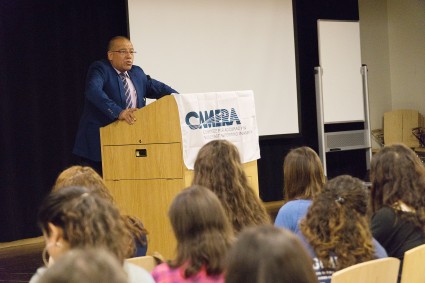When it comes to advancing Palestinian human rights and rebuilding the relationship between Gaza and Israel, activist Bassem Eid believes only the Palestinian government is standing in the way.

Born in Jordan-occupied Old Jerusalem, Eid has since founded the Palestinian Human Rights Monitoring Group and travels across the world advocating for a more accountable form of Palestinian government, increased transparency and a reconciliation with Israel.
Speaking to a crowd of more than 50 in the Chenango Champlain Collegiate Center (C4), Eid stressed that the perceived anti-Israeli sentiment and violence committed by some were not a reflection of the average Palestinian, but of terrorist group Hamas and a corrupt government headed by President Mahmoud Abbas.
“If tomorrow morning, Israeli Prime Minister Benjamin Netanyahu were to meet President Abbas, the first question he would ask is ‘whom are you representing, Mr. President? Palestinians in the West Bank? Palestinians in the Gaza Strip? Or Palestinians in the diaspora?’” Eid said. “And in my opinion, Abbas is only representing his two sons and his wife.”
Eid alleged that the violence being perpetrated in the West Bank and Gaza Strip was a reflection of economic stress and civil unrest that has been caused, at least in part, by Palestine’s “disengagement” from Israel, including fewer work permits being issued to Palestinians and fewer opportunities to work in Israeli settlements available.
“More and more corruption is committed by the Palestinian authority against the Palestinian people,” Eid said. “If you would come to any ordinary Palestinian, and ask him what are the three priorities he is seeking, he would say a job, to secure the education system and health system for my children. Nobody’s talking about settlements, war — no one’s even mentioning the foundation of the Palestinian state.”
According to Eid, many Palestinians prefer to work in Israel, with more than 92,000 Palestinians crossing the border each day to legally work in the neighboring country because monthly salaries are around $1,500 to $2,000, much higher than the average $400 in Palestine. It’s this stagnant financial situation that makes many turn to violence, both against Israel and also fellow Palestinians.
He also warned against the use of the boycott, divestment and sanction (BDS) campaign, which encourages individuals and institutions to cut ties with Israel financially.
“I think the BDS is a prelude of genocide to the Palestinians,” Eid said. “I want to see a BDS [proponent] go to a refugee camp and call to boycott Israel. Trust me, they’ll get thrown [out]. The Palestinians never, ever tried to impose a boycott on Israel.”
According to Eid, solving the current issues requires a more receptive Palestinian government which would mean working with Israel, and not against it or with other tumultuous Middle Eastern countries such as Libya, Syria or Saudi Arabia. Regarding holy sites such as Jerusalem, he said making them “open cities” with equal access to different nationalities would remedy disagreements.
The event was organized by Bearcats for Israel, the Binghamton University Zionist Organization (BUZO) and the Committee for Accuracy in Middle East Reporting in America (CAMERA). CAMERA BU representative Joshua Seed, a senior double-majoring in urban planning and Judaic studies, said Eid’s call to reinvigorate the Palestinian civil society is one students should be listening to.
“I think Baseem coming and giving his perspective is really valuable,” Seed said. “It’s giving college students, who are the people who are one day going to become leaders, giving them another perspective that you don’t hear in the media. They can form a more complete picture of what’s going on.”
Michael Wallach, a junior majoring in psychology, said hearing a Palestinian’s perspective on the conflict is something that most Jewish people don’t get to do.
“It was enlightening to know that there’s a Palestinian voice that is frustrated, as a lot of the Jewish-Israeli population is,” Wallach said. “I feel like that voice is squashed, if it exists, and a lot of Jewish people I know are skeptical if that perspective exists.”
This was originally published in SUNY Binghamton’s Pipe Dream and was written by Carla Sinclair. Bassem Eid was brought to SUNY Binghamton by Bearcats for Israel, Binghamton University Zionist Organization (BUZO) (SUNY Binghamton’s Emet for Israel supported group), and CAMERA Fellow Joshua Seed.

